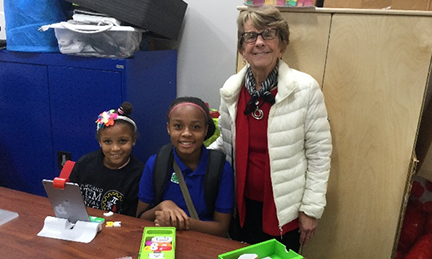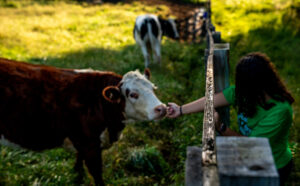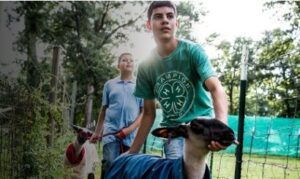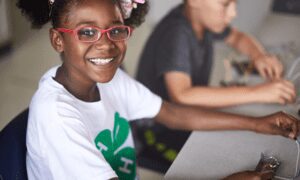In celebration of National Mentoring Month and to highlight the work of the National Mentoring Program, I connected with Jim Antal, Associate Administrator of the Youth Development, Prevention, and Safety Division at OJJDP, to get his insights on the importance of mentoring and how youth and families benefit from the program.
What is the core purpose of the mentor/mentee relationship?
Jim Antal (JA): I believe the purpose of the mentor/mentee relationship is built on three principles – respect, support, and growth. This relationship, like all relationships, is only successful if it is a “two-way street.” Mutual respect is the foundation for the relationship. This translates to how we speak to one another, how we respond to actions and words, and simply being there when you say you will. As this foundation of respect is formed, the opportunities for support and eventually growth will surface in a truly meaningful way. These three principles, when realized bilaterally, can lead to a life experience that both the mentor and mentee will cherish forever.
Who were your mentors (both personal and professional) and how have they attributed to your success today?
JA: My mentor, although I don’t think I ever called her that, was a former supervisor while working at Catholic Charities. Her passion for the work we did and her energy was always a motivator. She consistently emphasized the importance of our work (which was at times very administrative) and connected it to the ultimate benefits for the children and families we served as an agency. Her encouragement, and the personal time she took to teach me, led to many opportunities for me – including the chance to write and implement a grant program that was ultimately funded by OJJDP. Her characteristics and approach were thankfully something that I had experienced at a young age from my parents – both of whom I would consider my mentors.
Explain why the partnership between OJJDP and 4‑H is so important to young people in the program.
JA: The partnership between OJJDP and National 4‑H Council helps to expand mentoring services for at-risk youth across the country as a part of the OJJDP National Mentoring Program. The connection and broad reach of 4‑H programs help to grow the mentoring movement and ensure that youth involved in the programs receive high-quality mentoring services. The promotion and expansion of high-quality mentoring, grounded in best practices and research, is a core goal of the OJJDP National Mentoring Program. Cooperative Extension’s 4‑H program is well suited to deliver these services to youth in communities across the country, including rural, urban and suburban.
"A strong, positive mentoring relationship built on respect, support and growth can serve as a model for youth about relationships. "

How can communities benefit from programs like the 4‑H National Mentoring Program?
JA: I think communities benefit from the structure, support, and leadership that 4‑H offers through their signature programs. The logo and reputation of 4‑H symbolize stability and connection to others. I grew up in a rural community within Maryland, and my experience with 4‑H was always tied to agriculture – in particular, horses and other livestock. However, my experiences and exposure to 4‑H programs grew with my work in OJJDP. I see that the benefits for communities go well beyond an agricultural program, but one of support and opportunity for youth and community members.
Share your thoughts on the impact mentoring can have on a young person’s relationship with their family and peers?
JA: A strong, positive mentoring relationship built on respect, support and growth can serve as a model for youth about relationships. Many of the youth served by OJJDP-funded programs have experienced some form or level of trauma, which can directly impact their ability to develop and sustain healthy relationships with family and friends. This includes the ability to manage conflict, share experiences, listen, and provide support. While a mentoring relationship is not a cure for family conflict, it can help to act as a support in times of stress and hopefully offer lessons or guidance that a young person can use in the future.
What does it take to maintain the relationship between mentor and mentee?
JA: I think that mutual respect is a great foundation for a lasting relationship between mentor and mentee. It is also important for the mentoring organization to take the time at the match phase to consider shared interests and explore as well as clarify expectations for both in this relationship. Beyond the match, it is also critical to offer ongoing support for the mentor to help anticipate and manage any issues that may arise over the course of the relationship. Acting on an island, or feeling isolated is not a recipe for a long and positive mentoring relationship.
"It is important to realize and accept that you don’t have to do this alone, and that you are not expected to be a ‘super person’."
JA: Access to information permeates our society today, so finding any service – including a mentor – is as easy as typing a few words into your computer search engine. However, I would certainly recommend that you ask yourself a few questions before engaging in this search. What is prompting me to seek a mentor? Is it a crisis, or seeking guidance/counsel? How often do I want to meet with a mentor? Where and when am I comfortable meeting with a mentor? What do I expect to get out of a mentoring relationship? It would be helpful for someone looking for a mentor to understand their motivation for seeking a mentor and their expectations for that relationship.
What advice would you offer to someone who serves as a mentor to young people?
JA: I would certainly recommend that they take advantage of any and all resources made available to them by the mentoring organization that made the match. This includes training, ongoing consultation, and resources or suggestions for mentor activities. It is important to realize and accept that you don’t have to do this alone, and that you are not expected to be a “super person.” The OJJDP National Mentoring Resource Center has a variety of resources for mentors and mentoring programs. The website can act as a one-stop shop for questions and resources.
Why do you think having a mentor, at any stage of your life, is beneficial?
JA: The demands of life and work can be overwhelming, or at least stressful. Sharing these experiences with others who can provide perspective, support and guidance can help to avoid a crisis or offer direction during bad times and be there to celebrate life’s small and big successes.
The program described here is funded through grants from OJJPD, Office of Justice Programs, U.S. Department of Justice. Neither the U.S. Department of Justice nor any of its components operate, control, are responsible for, or necessarily endorse, this page (including, without limitation, its content, technical infrastructure, and policies, and any services or tools provided).
















